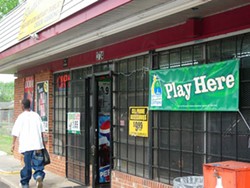The first week the lottery came to North Carolina, the staff of Southside Mart could barely pause for a moment, even for a drink of water. Demand was constant. The store sold out of bigger-payoff tickets, the $2 Blackjack and the $5 Carolina Cash, within three days. But to Khalid Al Nabulsi, a cashier at the store on West Boulevard, the lottery -- and the brisk ticket sales that came with it -- isn't a clear-cut triumph.
"For the state, for education, it's good. For the people, it takes their money," Al Nabulsi said between ringing up customers.
Nevertheless, people continued last week to line up for the scratch-off tickets that the NC Education Lottery introduced March 29. Southside Mart in west Charlotte is ground zero for lottery sales in Mecklenburg County. It's the top ticket-seller here and ranks 36th statewide in sales, according to April 11 lottery commission data.
"I want to win," said John Williams, a 44-year-old Charlotte electrician who estimated he'd played every day since the lottery's start, once winning $100. "It's why everybody plays the lotto. They want to hit it big. Get paid."
If getting rich -- or even finding money to make the car note -- is the goal, a rational person might try a better tact than lotto. Even a savings account offers a better return, as hopelessly bourgeois as it may sound. If you're hoping to win $150 from a Tic Tac Toe scratch-off ticket, you fare only a one-in-9,006 chance. A person is about as likely to attempt suicide this year, according to the National Safety Council.
So why do people play? Well, people aren't always rational, and they aren't always averse to risk. And as one psychology professor notes, scratch-off tickets in particular, with their small, unpredictable payouts, are made to appeal to the way human beings are conditioned.
"We're sort of hard-wired to repeat behaviors that have that result, even when they're not paying off for us," said June Foley, an associate professor at Clinton Community College in Plattsburgh, NY.
The lotto is popular -- sales have topped $51 million as of April 10. Teresa Mosley, who says her daughter has won $150, spends about $5 each day from the tips she earns as a food service worker and considers it entertainment. So far, she's won about $35. "I like the fun part, just taking a chance," said Mosley, as she left the store and got into her Nissan Maxima with a "God Bless America" sticker on the back bumper.
North Carolina was one of the last states to enact a lottery. When Gov. Mike Easley signed off on the law in August, the state was the last on the eastern seaboard to sponsor a lottery. About half its sales are supposed to be paid out in prizes; the rest is to be used for education.
The lottery started with four games and then added two on April 18. Tickets for Powerball -- the wildly popular lottery with jackpots sometimes topping $200 million -- are expected to go on sale May 30.
These new games mean Charlotte lottery players no longer have to cross the border into South Carolina, which has had the games since 2002. Miriam Phillips, a 24-year-old convenience store worker with three children, used to buy scratch-off tickets when she worked at another convenience store in South Carolina.
Since the lottery's start here, Phillips has played about a dozen times. "A couple of times, I haven't won, but that's fine," she said. She didn't play the Powerball game in South Carolina, and said she likely won't when those tickets are available here: Scratch-off tickets offer better odds.
Opponents of lotteries have long contended that they target on the hopeful, that they are, as professor Charles Lyons of Eastern Oregon University puts it, a "poor person's stock market." Ticket outlets are frequently clustered in poorer neighborhoods. Says Foley, "My concern is that [lottery players] really believe that the lottery is their best chance in life -- that working hard or going to school or things that more middle-class people are going to view as 'my best chance of success' -- aren't actually options."
What effect the lottery will have in Charlotte isn't yet known. Carol Hughes, chief executive officer of Crisis Assistance Ministry, said her agency isn't likely to see the effects for several months. "We have a real delayed impact with things like this," Hughes said. "When you have people who have a gambling problem, it's going to be several months until you're down to your last penny."
David R. of Gambler's Anonymous (hence the initial-only last name) said compulsive gamblers are more likely to pick methods that offer more control over the game, such as betting on sports. "Then again, any form of gambling is gambling, and if one isn't available, somebody will do something else," he said.
If North Carolina's lottery is to raise money for education, the lottery's job is to make sure people don't do their gambling elsewhere. There's a whole body of study into why people continue to play lotto, despite the odds, and how to make sure people continue doing just that, said Eastern Oregon professor Lyons. It would be naïve to think North Carolina lottery officials won't use that knowledge to their advantage, Lyons said: "The state of North Carolina would have an interest in getting as many people to gamble as possible, presumably, if they are going to profit from it."
People aren't wired to assess probability well, Foley said. One weakness is what psychologists call the availability heuristic. "We don't typically judge the odds of something happening by looking at the back of the ticket and seeing it's 165 million to one," Foley said. "We judge our likelihood of winning on whether it's easy or not to think of winning the lottery, which makes people miscalculate their odds.
"It's kind of interesting," she concluded, invoking a well-known psychological experiment by behaviorist B.F. Skinner in which rats intermittently received food after pressing a lever. "The rat will push the lever more times without being rewarded if he can't predict when the reward will come."
Speaking of 4.40000
-

Live Photo: Josh Groban
Sep 12, 2007 -

Queer City After Dark
Nov 15, 2006 -
Y? Why Not?
Sep 6, 2006 - More »
Latest in News Feature
More by Karen Shugart
-
Mecklenburg and beyond ...
Feb 10, 2009 -
Mecklenburg and beyond ...
Feb 9, 2009 -
Mecklenburg and beyond ...
Feb 6, 2009 - More »
Calendar
-

Queen Charlotte Fair @ Route 29 Pavilion
-

NEW WINDOW GALLERY-Pat Rhea-ACRYLIC PAINTINGS-April 05-30 2024 VALDESE, NC 28690 @ New Window Gallery/Play It Again Records
- Through April 30, 12 p.m.
-

TheDiscountCodes
-

"Blood Residue Analysis of Paleoamerican Stone Tools in the Carolinas" @ Native American Studies Center
- Fri., April 26, 12-1 p.m.
-

Brightfire Music and Arts Festival @ GreenLife Family Farms










